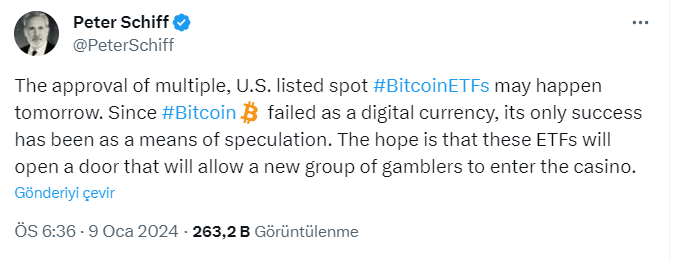Famous gold bull and Bitcoin adversary Peter Schiff shared his views on the potential approval of multiple spot Bitcoin ETFs. His statement points to a development that could reshape the world of cryptocurrency. Schiff’s perspectives shed light on Bitcoin’s journey from a cryptocurrency experiment to a speculative asset.
Bitcoin’s Evolution: From Cryptocurrency to Speculative Asset
According to Peter Schiff, Bitcoin has achieved success primarily as a speculative tool, departing from its original vision as a cryptocurrency. The original purpose of the decentralized peer-to-peer transactions concept of cryptocurrency has encountered challenges and limitations that have prevented its widespread adoption for daily transactions.

However, the resilience and unique qualities of Bitcoin have positioned it as a store of value and speculative asset. Investors are increasingly turning to Bitcoin not for its utility as a currency but for its potential as a tool for investment gains. This shift in perception marked a significant moment in Bitcoin’s narrative, and its success was measured more in terms of price speculation than transaction functionality.
Spot Bitcoin ETFs: A Potential Game Changer
The expectation of approval for multiple spot Bitcoin ETFs in the US adds a new dimension to the ongoing evolution of Bitcoin. Schiff expresses a cautious perspective by comparing the potential influx of ETFs to opening the doors of a casino to a new group of gamblers.
This analogy implies a degree of risk and speculation associated with ETFs, as they provide a way for market participants to interact with Bitcoin without directly owning the underlying asset.
Into Uncharted Territory: Navigating Bitcoin’s Future
As the cryptocurrency space continues to mature, the approval of spot Bitcoin ETFs could mark a significant milestone. It could potentially attract institutional and individual investors interested in entering the digital asset market by further moving Bitcoin into the mainstream financial arena.
What’s important is understanding the implications of this change. While Bitcoin’s foundations as a decentralized and borderless form of value remain solid, its role in the broader financial environment is changing.
Investors and market observers need to navigate this changing landscape by acknowledging the potential benefits and risks associated with the integration of Bitcoin into traditional financial instruments like ETFs.

 Türkçe
Türkçe Español
Español









